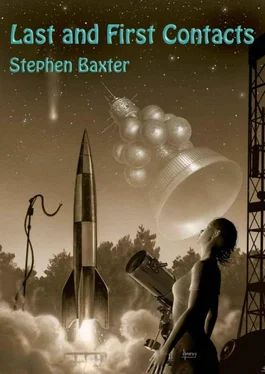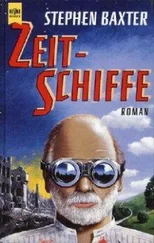Stephen Baxter - Last and First Contacts
Здесь есть возможность читать онлайн «Stephen Baxter - Last and First Contacts» весь текст электронной книги совершенно бесплатно (целиком полную версию без сокращений). В некоторых случаях можно слушать аудио, скачать через торрент в формате fb2 и присутствует краткое содержание. Город: London, Год выпуска: 2012, ISBN: 2012, Издательство: NewCon Press, Жанр: Фантастика и фэнтези, на английском языке. Описание произведения, (предисловие) а так же отзывы посетителей доступны на портале библиотеки ЛибКат.
- Название:Last and First Contacts
- Автор:
- Издательство:NewCon Press
- Жанр:
- Год:2012
- Город:London
- ISBN:978-1-907069-40-6
- Рейтинг книги:5 / 5. Голосов: 1
-
Избранное:Добавить в избранное
- Отзывы:
-
Ваша оценка:
- 100
- 1
- 2
- 3
- 4
- 5
Last and First Contacts: краткое содержание, описание и аннотация
Предлагаем к чтению аннотацию, описание, краткое содержание или предисловие (зависит от того, что написал сам автор книги «Last and First Contacts»). Если вы не нашли необходимую информацию о книге — напишите в комментариях, мы постараемся отыскать её.
Last and First Contacts
Last and First Contacts — читать онлайн бесплатно полную книгу (весь текст) целиком
Ниже представлен текст книги, разбитый по страницам. Система сохранения места последней прочитанной страницы, позволяет с удобством читать онлайн бесплатно книгу «Last and First Contacts», без необходимости каждый раз заново искать на чём Вы остановились. Поставьте закладку, и сможете в любой момент перейти на страницу, на которой закончили чтение.
Интервал:
Закладка:
One evening in June, at the end of a shift, Dorothea walked with Father Kopleck across the big parking area before Production Hall F 1. Work units under the command of the SS were erecting a tall wire fence around the entire Hall, and Dorothea and the priest had to make an unwelcome diversion. She was exhausted from the day’s work, and felt increasingly heavy on her feet.
For his part Father Kopleck was restless, angry. He had been administering funerals in Trassenheide, the compound of the indentured workers. Many of the Poles were Catholics. He was native to this place; it seemed to damage his soul to have to oversee so many funerals of so many foreigners.
To distract them both she spoke of the work done on the comet. Kopleck, who had been in on the secret from the beginning, was one of the few in whom she felt able to confide.
‘They grew impatient,’ she said. ‘Doctor von Braun and the others. So they cut it open.’
‘They did what?’
‘It was done under Doctor von Braun’s personal supervision. I was not there; I saw the results later. The comet is now in two sections: the heavy propulsion unit that was below, and the lighter, more complex components above, now removed. They used oxy-acetylene torches from the production workshops. Hacksaws, in some places. And parachute thread.’
‘Parachute thread?’
‘I mean, from the comet’s own chute. The thread itself is a mystery – such a simple component, yet quite beyond us! I have handled some of it. Light as a fishing line, yet unbreakably tough. They have fixed this to frames and use it like a hacksaw blade; it goes through hardened steel like butter, I have seen it. And they used this to cut the comet’s big structural support.’
‘So they decapitated it.’
His tone was aggrieved, and she glanced at him, uneasy. She sometimes fretted that he was liable to talk himself into trouble. ‘The upper section may contain the “brain” of the ship. There may be some equivalent of the electronics of the A4, something like its gyroscopic guidance. The “gifts” it brought for us, the discs and pods and other baubles, have been taken away for analysis. But the work on such items has been perfunctory.’
‘Compared to the work on the engine section?’
‘Yes.’ She tried to remember what she had seen, the diagrams she had been shown by friendly, or naive, technicians. ‘There are banks of intense light sources. So intense they themselves can cut metal! The technicians have been able to activate some of them.’ Experiments which had cost one man his life. ‘These light sources are arranged in a kind of hollow sphere, so that their beams concentrate on a point at the centre of the sphere. And into this point a pellet is fired. We have found a kind of magazine with many of these pellets.’
‘Pellets? Of what?’
‘Of isotopes of hydrogen and helium, it seems. The physicists speculate that under the intense pressure of the light beams these pellets are made to undergo nuclear fusion…’
He smiled now. ‘My father and grandfather were fishermen. My grasp of theoretical physics is surprisingly limited.’
‘I’m sorry. The pellets go off like small bombs. One after the other, very rapidly. But these explosions do not destroy the ship. On the contrary, they push it forward, like a firecracker throwing a tin can in the air. The physicists marvel at all this, at how so much energy can be stored and deployed in such a compact form.’
‘And the weapons designers imagine how it would be—’
‘If such a thing were mounted on the tip of an A4, yes.’
He held her arm. ‘Stand back.’
A convoy of trucks rolled across the open space before them, heading for a barrier set in the brand new fence around Hall F 1. There the trucks had to queue, engines running, while papers were shown and orders discussed. Dorothea and the priest were held up.
Dorothea found herself standing beside one of the trucks. It was like a truck for transporting cattle or sheep, a dirty, smelly thing with wooden slats enclosing its bed. But in that space were crammed humans, not animals. They were all men as far as she could see, all wearing what looked like grimy striped pyjamas. They were all standing; in fact there was no room for them to sit. To Dorothea they looked like old men, gaunt, many hairless, even toothless.
But then one of them spoke to her. ‘Hello, lady.’ He smiled a gappy smile. She saw that he wasn’t old at all. He was pressed against the wooden slats, holding on with thin fingers. He was distinguished from the others by a red triangle sewn to his striped shirt.
‘Don’t speak to him,’ Kopleck murmured.
‘You are prettier than these uncouth fellows I must travel with. My name is Dirk. I am a Dutch fellow.’ His German was heavily accented.
The other men in the truck were watching, wide-eyed.
She found herself saying, ‘My name is Dorothea.’
‘Dorothea! Pretty name. Where from, Dorothea?’
‘Munich.’
‘Pretty place. Me, I came from Buchenwald most recently. You heard of Buchenwald? Before that from Nijmegen. You heard of Nijmegen?’
‘I noticed your red triangle.’
He smiled. ‘Oh, this old thing? Means I was in the resistance.’
‘Hey! You!’ An SS man came running up, rifle in hand. ‘Shut up!’ He slammed the butt of his rifle against the slats, into Dirk’s fingers. Dirk fell back with a howl of agony, into the darkness of the truck.
Kopleck was already marching Dorothea away.
The RAF bombers came on the night of 17 thAugust.
The sirens sounded at midnight. The Lancasters and Halifaxes came in over the sea, so there was very little warning, and there was only perfunctory resistance from German planes and anti-aircraft fire.
The girls from Dorothea’s dormitory scrambled out of the building, bundled in dressing gowns and coats. The sky was clear, the moon full. Led by wardens wielding blue torches, the girls made for their assigned bunkers, talking loudly, nervously.
But Dorothea broke away and ran for Production Hall F 1. She knew that Adam was on duty on the fence there tonight. She had barely seen him for months. She still had not told him her own deep secret; she’d not had the chance. Soon it would be obvious to everybody, of course. But if this was to be their last night on Earth, she wanted him to know that he was, or would have been, a father.
She found him at the F 1 fence. The big gate was open, and officers and other ranks were fleeing for the bunkers. When he saw her he grabbed her arm. ‘What are you doing here?’ His voice was all but drowned by the sirens.
‘I had to see you. We have to talk.’
‘What, now?’
There was a shuddering thump, deep and visceral. They both staggered.
She looked up. She could see the RAF planes now, like moths, black against a moonlit sky. There must have been hundreds of them. They were dropping flares, red, white, green, brilliant pinpricks that trailed smoke as they fell.
‘This is just the first wave,’ Adam muttered. ‘The next will use the flares and the lights of the fires for positioning.’
‘We have to get to the bunkers.’
‘No. Too late. The factory,’ he said, making a quick decision. ‘The basements are strong. Come on.’ He grabbed her arm and they ran through the gate in the fence into the Hall compound, and through big access doors into the factory itself.
Inside, the overhead fluorescent lamps were going out one by one as somebody belatedly turned out the lights. Dorothea gazed around in wonderment. She had never been in here before. This was a pilot production line for making missiles, and she saw forges, welding facilities, lathes, drills, and heaps of components, hull sections, nose cones, tail fins; half-completed rockets lay on great flatbed trailers, some already painted with the camouflage colours they would need when launched by squads of technicians from hiding places in the forests of the Netherlands. All this glimpsed in flashes and shadows as the lights flickered and died, and people ran everywhere, prisoners or guards she couldn’t distinguish, crowding around staircases to the basement.
Читать дальшеИнтервал:
Закладка:
Похожие книги на «Last and First Contacts»
Представляем Вашему вниманию похожие книги на «Last and First Contacts» списком для выбора. Мы отобрали схожую по названию и смыслу литературу в надежде предоставить читателям больше вариантов отыскать новые, интересные, ещё непрочитанные произведения.
Обсуждение, отзывы о книге «Last and First Contacts» и просто собственные мнения читателей. Оставьте ваши комментарии, напишите, что Вы думаете о произведении, его смысле или главных героях. Укажите что конкретно понравилось, а что нет, и почему Вы так считаете.












